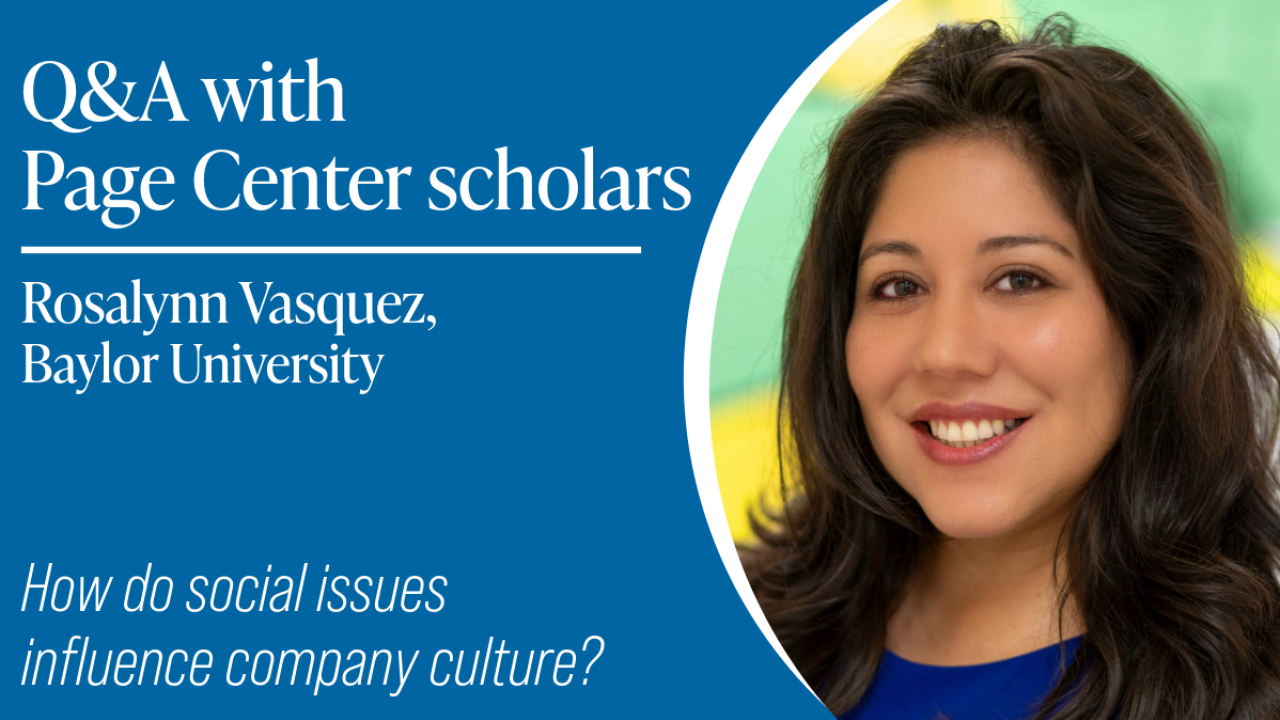July 18, 2024
Identifying PR’s role in ethics training, DEI initiatives – Scholar Q&A with Rosalynn Vasquez

With champions and detractors in every sector of the country, employing diversity, equity and inclusion (DEI) initiatives has been an unpredictable pursuit for companies in the United States. Rosalynn Vasquez, Baylor University, is leading a study to understand how U.S. companies are addressing hot topic issues like DEI, the impact on chief diversity officers, and implications for their ethics training programs. Through in-depth interviews, Vasquez hopes to build an understanding of social issues in the workplace and how they influence company culture, from an ethics of care perspective. How are these programs being shared and what do employees of color think of them? The project is part of the Page Center’s 2024 research call on ethics training in public relations, journalism, advertising, and strategic communication. In this Q&A, the three-time Page Center scholar shares an overview of her interest in social issues, discusses the need for this research, and explains her plan to pinpoint best practices.
How did your research interests and past work lead to this project?
I’ve always had a passion for social impact and social justice issues. I worked in the public relations industry for 15 years and anytime I saw an opportunity to participate in community relations, CSR, or DEI-related programs, I jumped in. During my MBA program, I became more acquainted with these topics as I focused on ethics and corporate sustainability and continued to do so in my Ph.D. program. All these experiences helped shape my research agenda which focuses on bringing greater awareness and understanding of stakeholder experiences and perceptions of DEI, ethics and sustainability. A few years ago, I examined the DEIB experiences and coping strategies of Latina leaders in public relations. Many of the participants who worked in agency and corporate roles openly discussed how their organizations and other underrepresented individuals navigated DEI in the workplace. These insights gave me a glimpse into this important topic, and I knew that I wanted to further explore it in a future study, especially from an ethics of care standpoint.
You’ve put a lot of energy into these areas of study, what drives your interest in this space?
Yes, I genuinely care about these topics very much not only because of my identity and values, but also because I see a deep connection to the role of public relations. Oftentimes I hear people talk about public relations as only publicity, promotion, or spin and that mindset completely misses the mark of what it’s truly all about, which is relationships, fairness, justice, advocacy, ethics of care. That’s why I think public relations has a role to play in building the value proposition for DEI and shaping company culture and climate.
Through my study, I hope to address many questions. It’s been four years since the pandemic, Black Lives Matter social movements, and George Floyd murder. We saw an increase in DEI trainings and DEI officer positions. Companies were making pledges and policies to make DEI a strategic priority. What’s changed? How are companies redefining or rebranding their DEI efforts? What's missing? What are some best practices?
Do you have expectations or thoughts on potential answers to these questions?
Yes, I have some thoughts as I’ve been following the growing pushback and resistance to DEI, especially with anti-DEI legislation across the country and the dismantling of offices and roles. I expect some companies are having more difficulty than others based on their location and leadership. It will be interesting to learn how companies are communicating and operationalizing DEI in this socio-political climate. We have an upcoming presidential election on the heels of the Supreme Court decision on affirmative action. So, I think this study will also shed some light on how companies are adapting to how they implement and express their values regarding DEI.
Can you walk us through your plan for the study?
Over the summer, I’m conducting pilot interviews with a few public relations/communication leaders and chief diversity officers to gain preliminary insights, build my contact list, and finalize my interview guide. In the fall, I plan to reach out to 25-30 senior corporate communicators and DEI officers in U.S.-based companies to conduct confidential in-depth interviews. Qualitative data will be very insightful in the backdrop of a particularly anti-DEI socio-political climate. There is a map that shows states that have passed or are considering anti-DEI bills, so it would be interesting to note some of the differences within companies, as well as provide best practices for those who have extremely limited guidelines by which they can implement DEI trainings or programs.
What do you have to say about the Page Center and its role in helping you with your research?
The Page Center is an incredible leader and supporter of social impact topics. I’m grateful for the opportunity to dive deeper into this important research topic and receive valuable feedback from the board and fellow scholars. I’ve appreciated their support over the years; I’ve grown as a researcher and feel proud to be included in this community.
